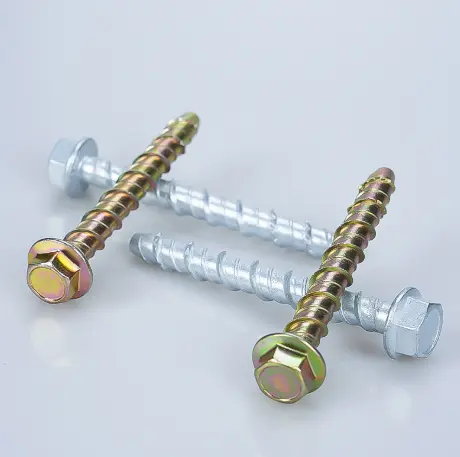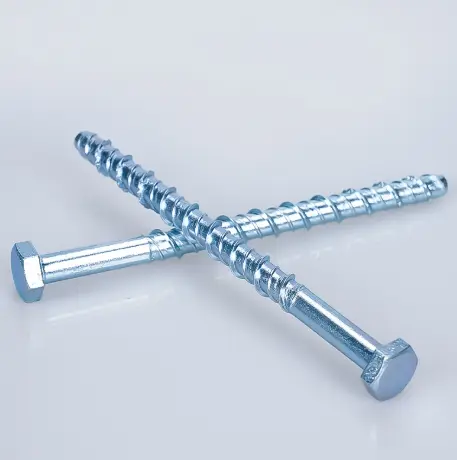caTEGORIES
Tags
Top Safety Measures for Secure Concrete Bolt Installations

Posted: October 09, 2025
Categories: News
Installing concrete bolts sounds simple, but it’s no small task. One wrong move, and you’re looking at cracked concrete, loose fittings, or worse—someone getting hurt. Qewit Fasteners Co., Ltd., a trusted name since 2004, knows this better than most. With their British-rooted expertise and a knack for delivering top-notch Hex Head Concrete Bolts and Hex Flange Head Concrete Bolts, they’ve built a reputation for quality and reliability across Europe and beyond.
Their products, designed for everything from solid concrete to natural stone, are backed by ISO 9001 certification and a commitment to “delight the customer.” But even the best bolts won’t hold if you skip safety.
Why Is Personal Protective Equipment Essential for Installing Concrete Bolts
Drilling into concrete isn’t like cutting butter. It’s loud, dusty, and sometimes unpredictable. Personal protective equipment (PPE) is your first line of defense.
Safety Glasses
Concrete dust and flying chips can turn a simple job into an eye doctor’s visit. Qewit’s bolts, sized 6mm to 16mm, require precise drilling, which kicks up debris. Safety glasses keep your eyes safe from those tiny, pesky particles.
Work Gloves
Ever tried gripping a drill with sweaty hands? It’s a recipe for slips. Work gloves give you a solid hold on tools and protect your hands from sharp bolt edges or rough concrete surfaces. Plus, they make you feel a bit like a pro, don’t they?
Dust Mask
Breathing in concrete dust is no joke—it can irritate your lungs or worse. A dust mask is non-negotiable, especially when drilling for Qewit’s self-threading bolts. It’s a small step that saves you from coughing fits later.
How Can You Ensure Proper Drilling for Concrete Bolts
Drilling is where the magic happens—or where things go south. Qewit’s bolts cut their own threads, but only if you set them up right.
Correct Drill Bit Selection
Pick a carbide-tipped or masonry bit that matches the bolt size (6mm to 16mm for both Hex Head and Hex Flange Head Bolts). Using the wrong bit can mess up the hole or dull your tools faster than you can say “oops.”
Accurate Hole Depth
Qewit’s Hex Head Bolts can go up to 400mm in length, so measure twice, drill once. Too shallow, and the bolt won’t hold; too deep, and you’re wasting energy. Check the bolt’s nominal length and aim for precision.
Dust Control Measures
Dust isn’t just annoying—it’s a hazard. Use a shop vac or dust extraction system while drilling. Qewit’s bolts work in hollow and solid concrete, so keeping the hole clean ensures a tight fit. Nobody wants a bolt that wobbles.
What Makes Surface Preparation Critical Before Installation
You wouldn’t paint a wall without cleaning it first, right? Same goes for concrete bolts. A clean surface is key to a strong hold.
Clean Base Material
After drilling, blow out or vacuum the hole to clear dust and debris. Qewit’s self-threading bolts rely on clean contact to grip properly. A dirty hole means a weak anchor, and nobody’s got time for that.
Verify Material Suitability
Not all surfaces play nice with bolts. Qewit’s products shine in solid concrete, hollow blocks, bricks, and natural stone. Double-check your material before starting—hollow concrete might need extra care compared to dense blocks.
Check for Obstructions
Hidden pipes or rebar can ruin your day. Use a stud finder or consult site plans to avoid surprises. Drilling into rebar is like hitting a brick wall—literally and figuratively.
How Do You Select the Right Concrete Bolt for Safety
Choosing the right bolt isn’t just about size—it’s about matching the job. Qewit’s range gives you options, but you’ve got to pick wisely.
Hex Head Concrete Bolts
These are your go-to for medium to heavy-duty jobs. Made of carbon steel with finishes like zinc plating or HDG, they’re tough and corrosion-resistant. Perfect for solid concrete or stone, they’re built to last.

Hex Flange Head Concrete Bolts
The flange is a game-changer. It acts like a built-in washer, spreading the load and gripping tight in high-vibration settings like machinery or industrial setups. Qewit’s flange bolts come in sizes up to 16mm, with finishes like zinc flake for extra durability.
Material and Finish Options
Qewit offers carbon steel with finishes like hot-dipped galvanizing (HDG) or zinc flake to fight rust. For coastal or humid environments, these finishes are a lifesaver, keeping your bolts secure for years.
Why Is Proper Torque Application Important
Tightening a bolt isn’t about brute force. Too much or too little torque can spell disaster.
Use Calibrated Tools
A torque wrench is your best friend. Qewit’s bolts, built to standards like DIN 933, have specific torque requirements. A calibrated tool ensures you hit the sweet spot without stripping the threads.
Follow Manufacturer Guidelines
Qewit’s bolts come with clear specs—stick to them. For example, their Hex Head Set Screws (DIN 933) range from grades 4.8 to 12.9, each with its own torque needs. Ignoring these is like skipping the recipe for your grandma’s famous cookies.
Check Flange Stability
For Hex Flange Head Bolts, the serrated flange locks in place to fight vibration. Make sure it’s snug against the surface. A loose flange is like a wobbly table—annoying and unsafe.
What Are the Risks of Incorrect Installation
Mistakes happen, but with concrete bolts, they can be costly. Here’s what you’re up against if things go wrong.
Bolt Failure
A poorly installed bolt might shear or pull out under load. Qewit’s bolts are tested for tensile strength, but they can’t perform if you skip steps. Think of it like building a house on a shaky foundation.
Surface Damage
Over-drilling or using the wrong bolt size can crack concrete or weaken masonry. That’s not just a repair bill—it’s a safety issue. Qewit’s technical support can help you avoid these pitfalls.
Safety Hazards
Loose bolts can lead to collapsing structures or equipment failure. In a busy construction site, that’s the last thing you need. Proper installation keeps everyone safe and your project on track.
How Can Qewit’s Services Enhance Installation Safety
Qewit isn’t just about selling bolts—they’re about making your job easier and safer. Their services go beyond the product.
Technical Support
Got a question about bolt selection or installation? Qewit’s team offers expert advice. Their experience with projects across Europe and Asia means they’ve seen it all.
Quality Assurance
Every bolt is backed by ISO 9001 certification, with optional 3.1 certification for extra peace of mind. Qewit’s testing facilities—think Vickers Hardness Testers and Salt Spray Chambers—ensure each batch meets global standards.
Custom Solutions
Need a non-standard bolt? Qewit’s ODM/OEM services let you customize sizes, finishes, or even threading. They’ll work from your drawings to deliver exactly what your project needs.
FAQs
Q1: What PPE Should I Wear When Installing Qewit’s Concrete Bolts?
Safety glasses, work gloves, and a dust mask are must-haves. They protect against dust, debris, and slips while handling Qewit’s 6mm-16mm bolts.
Q2: Can Qewit’s Concrete Bolts Be Used in Hollow Concrete?
Yes, both Hex Head and Hex Flange Head Bolts work in hollow concrete, bricks, and dense blocks. Just ensure proper hole depth and cleaning for a secure fit.
Q3: How Do I Know If I’ve Applied the Right Torque?
Use a calibrated torque wrench and follow Qewit’s DIN-standard guidelines. For Flange Head Bolts, check that the serrated flange grips the surface tightly.


